FEST canceled, 70 Acres in Chicago, and city council members urge CTA president to resign
Plus, the city finalizes pride parade plans
Welcome back to ‘In the Loop’! We’ve got a good one for you today. It’s your newsletter team — Alexandra, Morgan, Isabella, Sam, Annabelle, Elizabeth and Audrey — back with another exciting newsletter edition to start off your week!
First, 14 East Staff Writer Morgan Kirsch attended a film screening and panel discussion for 70 Acres in Chicago. The film details the consequences of the public housing development Cabrini Green as a continuation from the 2001 film Voices of Cabrini. Panelists Mick Dumke of Block Club Chicago, Dearborn Homes Local Advisory Council Vice President, Etta Davis, leader of Lugenia Burns Hope Center, Tara Stamps and the Chair of the Preserve Lathrop Campaign, J.L Gross.
In recent DePaul News, today was the two-week mark of DePaul University’s ongoing encampment on the Lincoln Park campus. On Saturday night, the Office of the President sent out an email to faculty, staff and students saying the university had reached an “impasse” in negotiations with the DePaul Divestment Coalition. In the wake of the stalemate with encampment organizers, the music festival that takes place on the Quad annually, FEST, was canceled as of this evening.
In other Chicago news, city council members urge CTA President Dorval Carter to resign. The resolution to remove Carter will be introduced to the City Council by Alderperson Andre Vasquez at a meeting on May 22.
Tonight’s newsletter is sponsored by DePaul’s School of Continuing and Professional Studies.
If you want to show support for 14 East and ‘In the Loop,’ we invite you to donate directly to our newsroom. Whether it’s a one-time contribution or a monthly gift, every cent helps us build a newsroom that serves you, our readers, and we get 100% of your donation.
With that, let’s get into tonight’s news!
DePaul News: University announces they have reached an “impasse” with the encampment and FEST canceled
By Alexandra Murphy
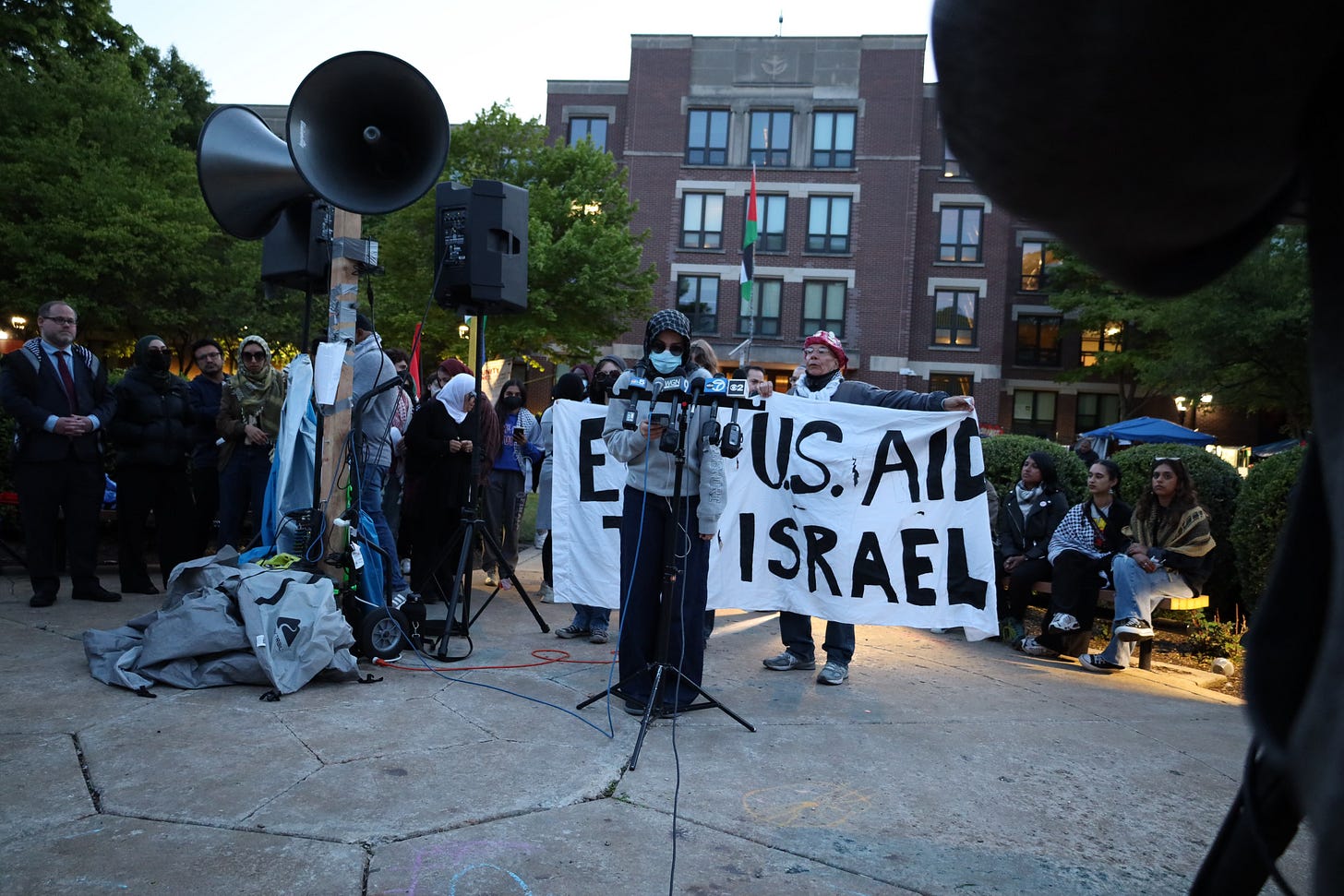
Over the weekend on Saturday night, the Office of the President sent out an email to faculty, staff and students saying the university had reached an “impasse” in negotiations with the DePaul Divestment Coalition.
“We believe students with the Divestment Coalition initiated the encampment with sincere intentions to peacefully protest. However, the responses to the encampment have inadvertently created public safety issues that put our community at risk,” the email read. The email also included additional responses to the Coalition's demands, stating that if students choose to accept the offer, they would need to take down the encampment by 12 p.m. Sunday, May 12.
A press conference was held at the center of the Quad shortly after the email, where multiple speakers who touched on the university announcement expressed concern that they were going to be forcibly removed from the encampment. The speakers included members of the DePaul Divestment Coalition, SGA president Parveen Mundi, Alderperson Byron Sigcho-Lopez (25th) and an organizer for Chicago for Justice in Palestine.
With the future of the almost two-week-long encampment in doubt, organizers of the DePaul Divestment Coalition voiced that the DePaul University administration gave little notice before asking them to take down the encampment immediately. Organizers said they will not leave until DePaul fully divests.
“I will be here with these students until DePaul divests,” Mundi said during the press conference. “Students have a right to protest and to do so without external forces interfering. It’s a matter of if the university could come to the table in good faith and have a conversation about our demands.”
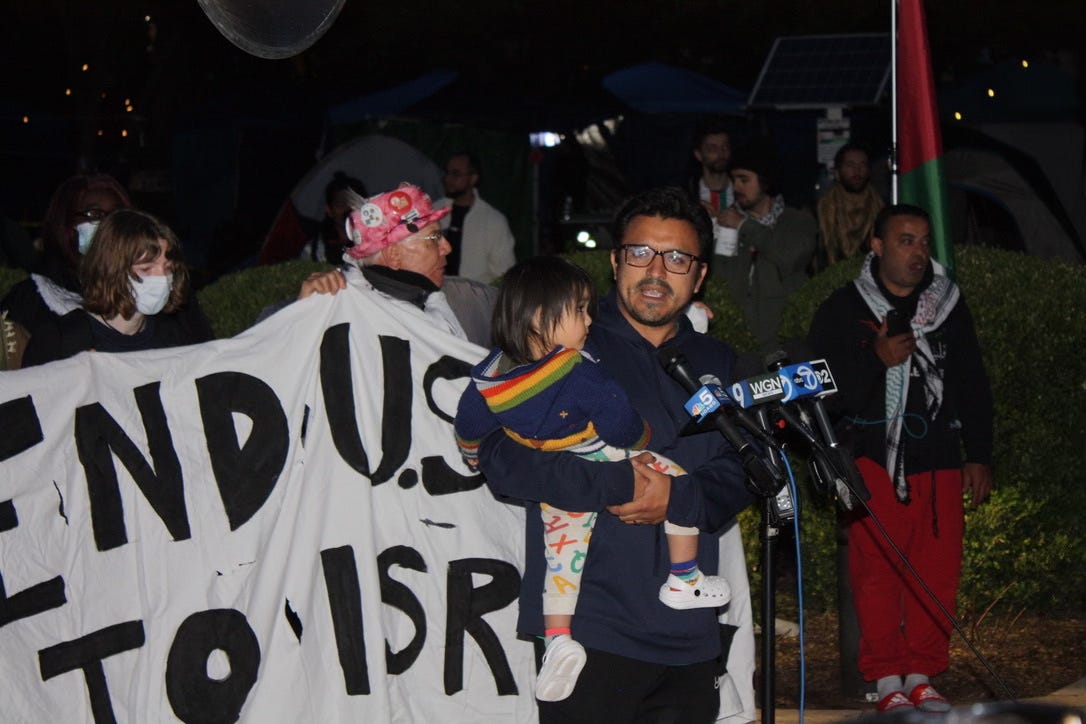
On Thursday, a DePaul public safety alert was released about a battery that occurred on the Quad at 7:55 p.m. off Fullerton and Seminary avenues, where someone who is not affiliated with DePaul was “approached by a group of males who took his flag.” It was reported that the victim was not injured and did not require medical treatment.
In response to the alert, media representative Henna Ayesh described the situation as being taken out of context from what she heard from other people who were on the Quad when the alert was sent out.
“That whole standard was actually false,” said Ayesh. “We have multiple people who were here during that time that they supposedly said someone with an Israeli flag got hit or something. There was no one here who got hit, I think it was just our marshals peacefully escorting them out.”
On Friday, the Office of the President sent out an email stating that there had been “calls from external entities specifically referencing the battery incident that occurred.”
The email went on to explain that the incident that occurred indicated escalated confrontations at the encampment, stating, “The safety of our community must continue to be our top priority.”
A similar sentiment was shared in the administration email on Saturday, expressing that the response to the encampment has created public safety issues that put the community at risk.
After the press conference came to a close Saturday night, there have been no other updates from the administration, although a rally was held by the DPU Coalition on Sunday around 2 p.m. CPD was present, but no escalation occurred.
DePaul University’s encampment was first set up on April 30, with Tuesday marking two weeks since students set up tents along the Lincoln Park Campus Quad. This also makes DePaul’s encampment the longest standing in the city of Chicago, surpassing the one at the University of Chicago, which had been disbanded by police after a week.
While the future of what will happen to the encampment remains unclear, in the wake of the stalemate with the encampment organizers, FEST was canceled as of this evening.
FEST, the annual music festival held on the Quad, was set to take place May 17 featuring a performance by rapper Swae Lee.
“We will refund all student and guest tickets in full,” the statement read.
You can find more about the cancellation from the Office of Student Involvement’s Instagram page here.
70 Acres in Chicago: Where Do We Go From Here?
By Morgan Kirsch
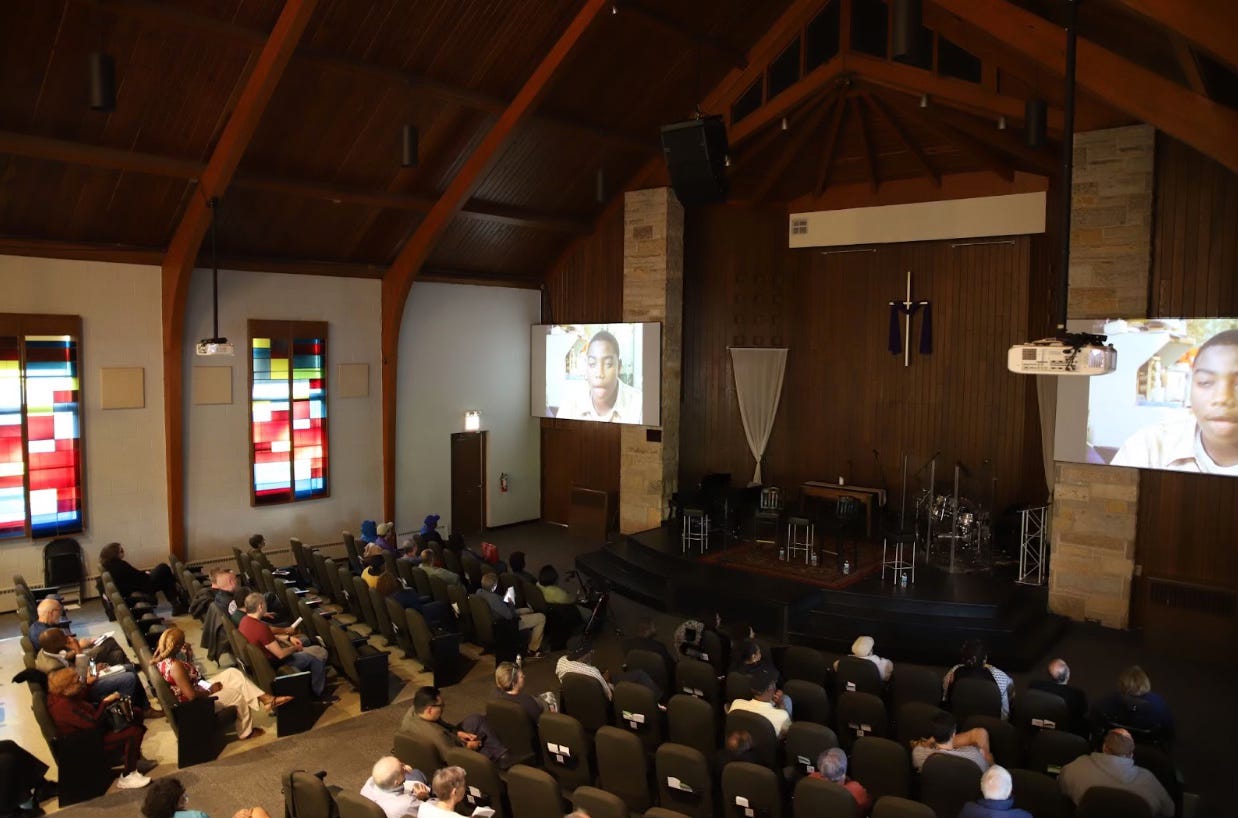
The New Life Community Church hosted a showing of the new documentary 70 Acres in Chicago: Cabrini Green Wednesday, May 8, which explored “the upheaval caused by the housing demolition in Chicago’s Cabrini Green neighborhood, from the razing of the first buildings in 1995, to the clashes in the mixed-income neighborhoods a decade later,” according to the film’s official website synopsis.
On the 25th anniversary of former Chicago Mayor Richard M. Daley and the Chicago Housing Authority’s (CHA) “Plan for Transformation,” a discussion panel examines the “failures” of the city to live up to its promise of transforming public housing for the better. Esteemed panelists include Mick Dumke, investigative editor for Block Club Chicago, Etta Davis, Vice President of the Dearborn Homes Local Advisory Council and a leader of the Lugenia Burns Hope Center, Tara Stamps, Chicago’s 1st District County Commissioner and J.L Gross, Chair of the Preserve Lathrop Campaign at the Lathrop Homes.
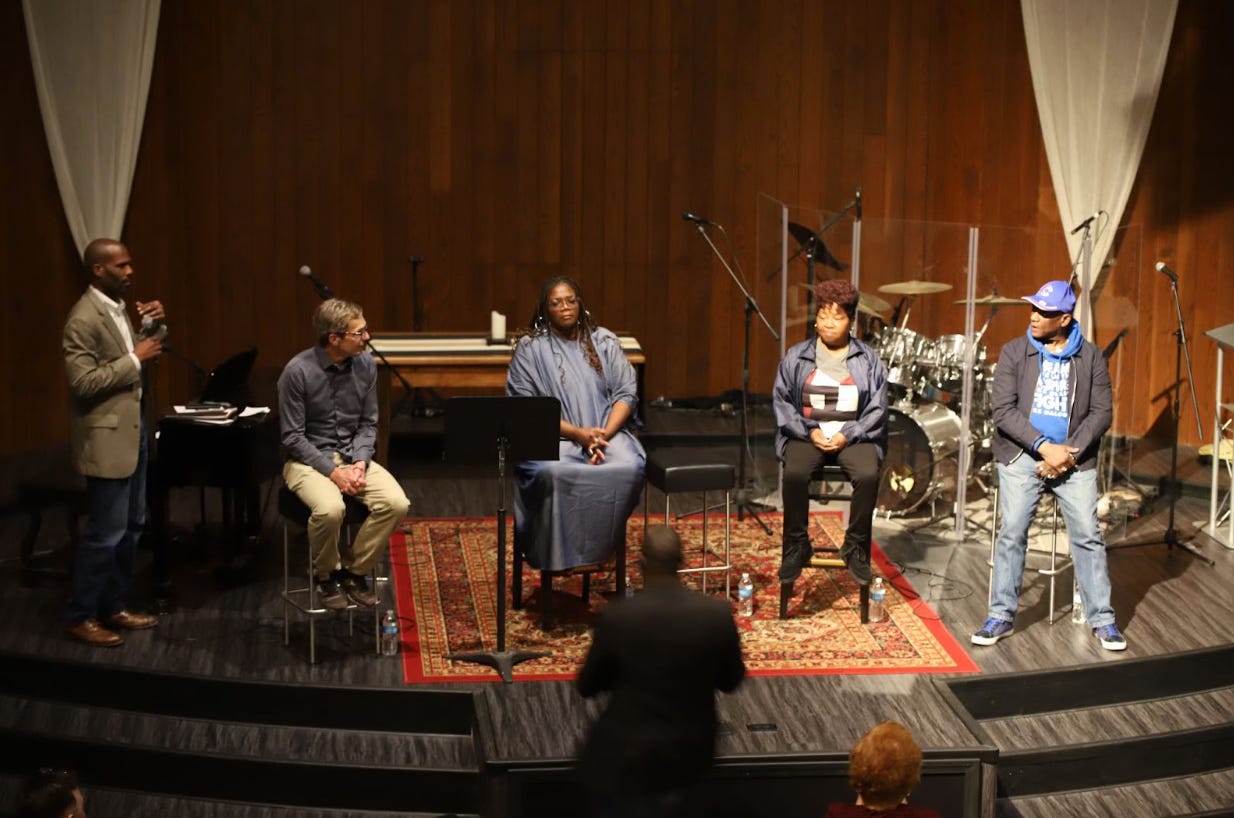
“The Plan for Transformation” demolished thousands of public housing units, relocating residents into mixed-income communities to rehabilitate the housing stock of Chicago. The plan has been hotly contested, with many claiming that after 25 years, the plan is far from fulfilling its promise. Others say the demolitions exacerbate racial and economic inequalities. These claims are further supported by panelist Dumke, who said the “16,000 family units lost between the time the plan for transformation was launched has coincided, of course, with the huge drop in the Black population overall in the city of Chicago.”
Filmed as a continuation of the 2001 film Voices of Cabrini, 70 Acres in Chicago was shot over the course of 20 years. It details the consequences of the public housing development in Cabrini Green for present and former residents. Due to dilapidation caused by a lack of investment and the neighborhood’s prime location, the affordable buildings were demolished and repurposed as “mixed-income” residences. During the demolition, a majority Black residents of Cabrini were forced out. Those few who were able to remain in the neighborhood encountered previously unforeseen barriers and what the film’s official website called an “unwelcoming cultural territory.”
1st District Commissioner Stamps describes her intense feelings watching the documentary. “I can’t help but tell you it was painful for me. It’s always painful for me, because we live in an America that loves to say ‘there’s no place like home,’ except for Black people, often enough, we can’t go home again,” she said.
Davis says she was immediately suspicious of the proposals in the Plan for Transformation. She warned her friends and neighbors not to relocate, predicting it would be difficult for them to return to their homes. “From day one I said there’s something wrong with this. I think they’re selling us a dream,” she said.
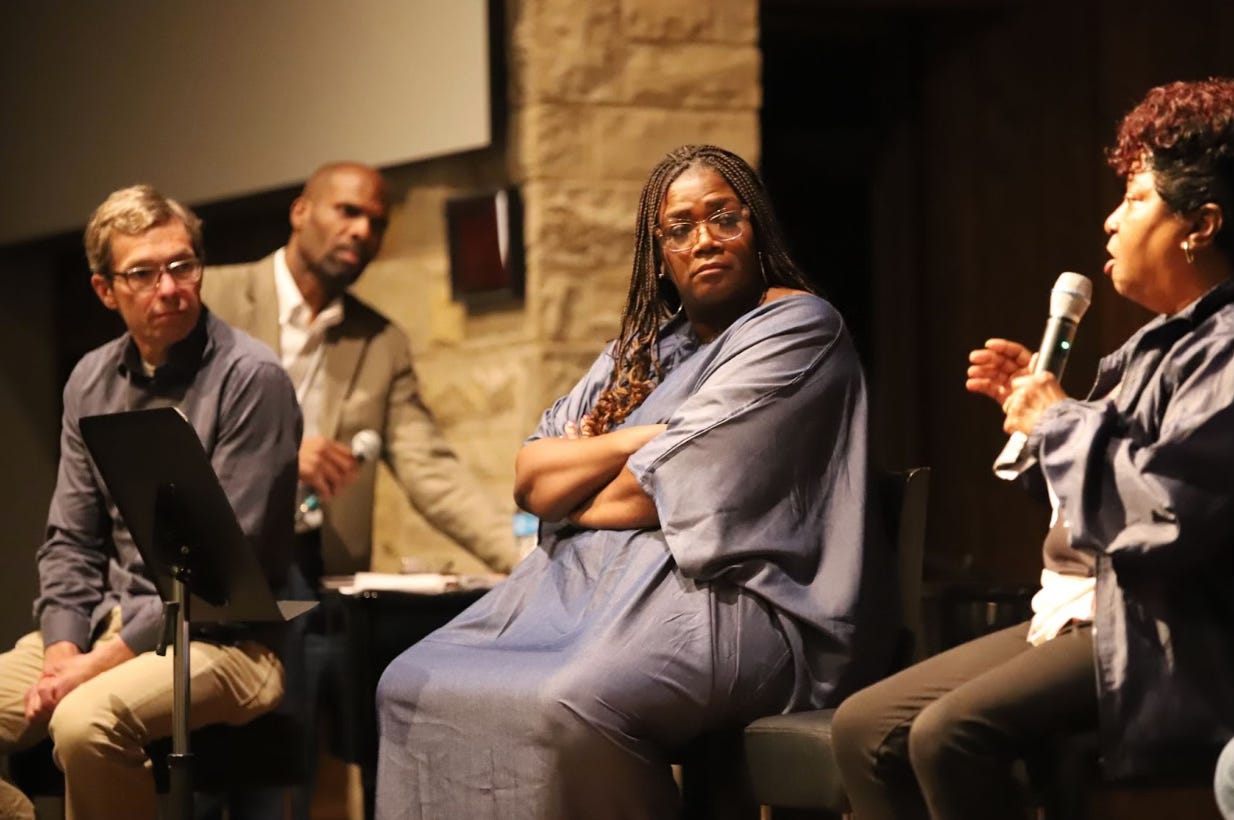
Davis claims the plan broke up families who wanted to stay together and facilitated white migration deeper into the city.
Referencing former Mayor Daley and the CHA, Davis claimed, “They knew that the land was valuable. They knew that whites wanted to come back to the city, and he gave them this valuable land to move back to.”
Stamps believes that the case of Cabrini Green has been “sensationalized” by the media. Redevelopment projects that level affordable housing do not only exist in Cabrini but, instead, occur in a multitude of neighborhoods.
Chair of the Preserve Lathrop Campaign, J.L. Gross, describes the impact “revitalization” has had on his own community: Lathrop Homes. Gross drew comparisons between the financial values tacked onto Cabrini and his community, saying “Lathrop is a valuable piece of land right off the river, and so people wanted it. They just go on and on until they got a hold of it.”
“All I really want is a better community in Lathrop, and right now we’ve killed that. What I had in the old Lathrop was a sense of community. I could walk down the streets, people could say hola and I would speak back, or they would say hello,” Gross said.
According to a 2017 report by WBEZ, only 7.81 percent of those households who had occupied the now-demolished units live in mixed-income communities. Some of those residents of color occupying these mixed-income communities have felt judgment and a lack of interest in community-building by their white, middle-class neighbors. Some original residents of Cabrini who were able to return to their neighborhoods found their new residences to be excessively inspected for signs of misuse.
“It vexes my soul that every time there is an experiment, there's a plan for improvement, there’s transformation, it’s on the backs of Black people and the cost of their blood,” Stamps said.
The discussion panelists hold many hopes for housing improvement in the future in light of the “failure” of the Plan for Transformation.
Dumke hopes for more transparency on the part of the CHA, claiming their present finances are “impenetrable” and the organization’s investments are difficult to trace.
Stamps believes the CHA should convert their many vacant lots into low-income housing units and further support the unhoused.
When asked what more it would take to solve these problems caused by redevelopment, Davis simply said, “The mayor needs to start doing his job by making the CHA do their job.”
Chicago Headlines
By Isabella Salinas
City finalizes pride parade plans - The city has added more participants while cutting out the Uptown area from the route. Last year the entry cap was set at 125 participants, and this year the city is allowing 150 entries to participate in the celebration. These past few months the city’s pride parade has undergone many changes in efforts to downsize the parade for “safety and logistical concerns.” To better align with the Chicago Police Departments shift changes, city officials also confirmed this year’s Pride Parade will move up its start time an hour earlier to 11 a.m. instead of noon. The kick-off intersection is now at Broadway and Sheridan, which shortens the route by a few blocks. Traditionally the parade started at Broadway and Montrose and proceeded south and southeast on Broadway, south on Halsted Street, east on Belmont Avenue, south on Broadway again and east on Diversey Parkway before ending in the park of Lincoln Park. Patrick Filbin of Block Club Chicago has more.
Thompson Center begins demolition ahead of conversion to Google headquarters – Last week, the city kicked off the process of transforming the Thompson Center located at 100 W. Randolph Street in the Loop district of Chicago into the Google headquarters . The building was previously the state government’s Chicago headquarters, and was sold in 2022 to a development firm representing Google. Google intends to use the building for its Chicago offices after the $280 million renovation project is complete, with the process expected to take several years. Andrew Adamns of Capitol News Illinois has more.
Aurora borealis in the city - This weekend, a solar storm brought numerous displays of the aurora borealis, better known as the northern lights to the Chicago area. The phenomenon is only visible in the Chicago area every few decades and according to The National Oceanic and Atmospheric Administration, Friday night had a weaker display compared to Saturday and Sunday. Those that got the best views of the northern lights were individuals as far away from the city lights as possible. That being said, the cloudy conditions of the city did not help in seeing the shiny display in the sky. Violet Miller at the Chicago Sun-Times has more.
Family of great horned owls found dead in Lincoln Park - A family of three great horned owls that resides in Lincoln Park's North Pond were all found dead, with the third and final member of the great horned family being found on Thursday morning. Experts said that rat poison could be the cause for the deaths. Almost 4 million great horned owls can be found in a variety of habitats across North America, including in Illinois which makes them the second-heaviest owl species in America. The loss of the birds raises concern for the amounts of rat poisoning residents in the area use. Experts say that they see many birds die due to rat poisoning, and they urge Chicago residents who experience a rodent problem to find a solution that does not involve poisons. Avani Kalra at the Chicago Tribune has more.
Chicago City Council members urge CTA president to resign - A resolution to remove the current CTA president Dorval Carter will be introduced to the City Council by Alderperson Andre Vasquez at a meeting on May 22. A total of 19 aldermen plan to back the resolution and are calling for him to step down or be fired. Former Mayor Rahm Emanual appointed Carter as CTA president in 2015. The resolution claims that Carter lacked transparency when it came to service cuts, hiring and overall safety for riders on the CTA. Jake Sheridan of the Chicago Tribune has more.
National Headlines
By Sam Freeman
President Biden may dismiss the latest poll – Surveys from The New York Times, Siena College and the Philadelphia Inquirer found that Trump was ahead of Biden amongst registered voters in five of the six battleground states. Biden led in Wisconsin while Trump surpassed him in Michigan, Arizona, Nevada, Georgia and Pennsylvania, according to the poll. With the November election months away, the Biden campaign remains unconcerned about the polls and plans to win votes with a $2 billion advertising campaign and reminders about Trump’s policies on abortion and democracy. Biden’s advisors have said that too many voters have forgotten the alarming years during Trump’s presidency. “Trump is trying to make the country forget how dark and unsettling things were when he was president,” Mr. Biden said at the Seattle fund-raiser. “But we’re never going to forget.” Reid J. Epstein from The New York Times has more information.
Some US college campuses use graduation as a defiant act – For weeks, students across the country set up encampments and called for their schools to cut ties with Israel and businesses that support it. The protests resulted in 2,900 arrests at 57 colleges and universities. Now, some students are using their graduation ceremonies to reiterate their demands. At Pomona College in Southern California, a few dozen pro-Palestinian protesters tried to block entry to Sunday’s evening commencement. In Berkeley, California, a small group of pro-Palestinian protesters at University of California, Berkeley waved flags and chanted during the commencement on Saturday. They were escorted to the back of the stadium, according to the San Francisco Chronicle. Both Columbia University and the University of Southern California canceled their main graduation ceremonies in favor of smaller gatherings. Although DePaul University's graduation ceremony is more than a month away, school leaders say they’ve reached an “impasse” with the pro-Palestinian protesters, leaving the future of their encampment unclear. Moriah Balingit of the Associated Press has more information.
Senator Bob Menendez’s corruption trial begins – Senator Bob Menendez faces trial in Manhattan on Monday morning for accepting bribes from three businessmen in Egypt and Qatar. Although Menendez wasn’t convicted in 2017 for a series of corruption charges, legal experts say the latest case is far more serious. Federal prosecutors say Menendez secretly acted as a foreign agent for Egypt and tried to derail criminal investigations. He faces a total of 16 felony counts ranging from bribery to obstruction of justice. If convicted, Menendez would face a maximum of 212 years in prison, although he would likely be much less considering he has no prior criminal record. A conviction of bribery, however, could prevent him from holding office. Bob Menendez has served as a senator of New Jersey since 1993. Salvador Rizzo from The Washington Post has more information.
Counterfeit fentanyl pills are becoming increasingly common – Counterfeit fentanyl pills seized by law enforcement are on the rise, a new study finds. The study, published in the International Journal of Drug Policy, shows more than 115 million pills containing illicit fentanyl were seized by law enforcement last week compared to the 71 million in 2022. These counterfeit pills are created to look like other opioid medications, such as oxycodone, but they are far more dangerous. Counterfeit pills are cheap to make and buy, and they are becoming easier to purchase through social media and the dark web. Fentanyl is fast-acting and delivers a brief but powerful high. It’s highly addictive, and people consume more of it than they would other opioids, making it easy to overdose. Because it’s in a fake prescription form, it can also be mistaken for a safer drug. In reality, there is no way to determine how much fentanyl is in them. "It's like Russian roulette," said Dr. Samuel Beckerman, an emergency medicine physician in Los Angeles. "One pill might be enough to make you stop breathing. Another pill might just be enough to get you high." Emma Bowman of NPR has more information.
14 East Pueblo: El Grito Festival to return after 10 years
By Annabelle Rivera
El Grito Festival, a two-day celebration honoring Mexican Independence Day, will return to Chicago in September.
The event will be hosted by the Illinois Hispanic Chamber of Commerce, Park District, the Mexican Consulate and the city of Chicago. It will have food, a bar, entertainment and a kid’s activity section.
Events commemorating Mexico’s independence from Spain used to take place Downtown before stopping a decade ago. In the years since, large car caravans have gotten together Downtown to celebrate.
“I think that for many years, our community has not had the opportunity to celebrate properly as other communities,” said Reyna Torres Mendivil, consul general of Mexico in Chicago. “I felt the need to recuperate the possibility for this celebration for our community as a vibrant part of the city.”
El Grito Festival will take place from 2-10 p.m. on September 14-15 in Grant Park. Tickets are yet to be announced.
Hey, Check This Out!
With Featured Columnist Elizabeth Gregerson
It is hard to believe that it has been almost ten years since some of us sat on our couches and heard Robert Durst whisper those fateful words, “Killed them all, of course,” on the HBO television series, The Jinx.
Originally presented as a documentary into the complicated life of Durst, the first season of the series evolved into the true crime investigation into the disappearance of Durst’s wife Kathie McCormack and murder of Durst’s friend Susan Berman. You might recognize this story from the 2010 film, All Good Things, which was inspired by Durst’s life.
Nine years after the first season premiered, the second season has been released on Max and covers everything that has happened in Durst’s life since his hot mic confession in season one. So far the show has covered the immediate reaction to its first season along with the investigation and trial for Susan Berman’s murder, which Durst was charged with. The second season also introduces more of the people in Durst’s life who enable his behavior.
This recommendation will be spoiler free for those of you who are not familiar with Durst’s story. While not necessary, watching the first season will definitely give viewers more context, background information and insight into Durst’s world.
Produced and directed by Andrew Jarecki, the first four episodes of The Jinx: Part Two are available to stream on Max.
Resources
Need resources regarding cooling centers, rental assistance, abortion access, COVID-19 testing and vaccines or mental health? Check out our complete list here.
That’s it for today! See you next Monday.
The 14 East Newsletter Team





